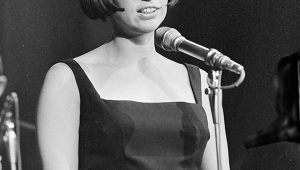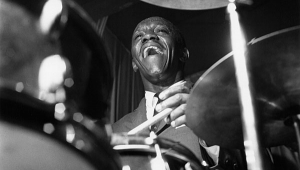| Columns Retired Columns & Blogs |
The Unmaking of Elvis Presley: New Reissues 1960-1972 Page 4
"Tiger Man was a very unbalanced mono recording," Jorgensen says. "At the time the TV producers didn't care about the sound. It was just a necessary evil to go with the picture. [In remastering] we didn't interfere with the high end because that's where the fragile echo of the guitar strings is hanging. We did re-EQ to get more bottom end and try to remove some of the alarming sensation of the tambourine that runs through it."
 Energized by the success of the TV special and the fact that he "still had it" in front of a live audience, Elvis then fell into one of those great bits of serendipity that mark the great successes of his career. Because of connections that several of his Memphis buddies had to American Recordings, a small studio in Memphis, Elvis decided early in 1969 to skip returning to Nashville and to record in his hometown for the first time since 1955. The resulting sessions, directed by producer/studio owner Chips Moman and initially released as From Elvis in Memphis, rank just below his Sun Recordings—and now, possibly, Tiger Man—as the finest of his career. They also provided new hits and a fresh sound to take to Las Vegas later that summer, for what became Elvis's triumphant return to live performing.
Energized by the success of the TV special and the fact that he "still had it" in front of a live audience, Elvis then fell into one of those great bits of serendipity that mark the great successes of his career. Because of connections that several of his Memphis buddies had to American Recordings, a small studio in Memphis, Elvis decided early in 1969 to skip returning to Nashville and to record in his hometown for the first time since 1955. The resulting sessions, directed by producer/studio owner Chips Moman and initially released as From Elvis in Memphis, rank just below his Sun Recordings—and now, possibly, Tiger Man—as the finest of his career. They also provided new hits and a fresh sound to take to Las Vegas later that summer, for what became Elvis's triumphant return to live performing.
Much of the quality of these sessions was due to Moman, who had already produced hits for Wilson Pickett, Dusty Springfield, Dionne Warwick, and the Box Tops, and who, along with his crack house band, wasn't all that impressed by Elvis. Regardless of the artist, Moman and his crew's sole focus was to make hit singles, and they didn't care whose toes they stepped on trying to do it. These sessions were, with the possible exception of the original Sun Sessions with Sam Phillips, probably the only genuine collaborative effort between artist and producer of Elvis's entire career. In Nashville and elsewhere, whether it was Felton Jarvis or anyone else in the producer's chair, Elvis generally ran the show. At American, Chips had an equal voice. The results are magical.
On the first disc of the new RCA reissue, Suspicious Minds: The Memphis 1969 Anthology, the Memphis album's original 12 cuts are joined by the singles from the session, which, following custom, were not included on the album. The second, 24-track disc features outtakes, alternate takes, and tunes left off the original album, nine of which had been unreleased until now. All in all, it's a generous, if still by no means complete (some cuts are labeled "alternate take 9", implying there are eight others, some of I assume remain unreleased), sampling of these important sessions. Peter Guralnick's liner notes are superb.
I A/B'd these tracks with several earlier LP and CD reissues; the new album's sonics are the best ever, and in spots are positively breathtaking. Elvis is dead center, yet still part of the nonchalantly expert house band spread out behind him. Most important, the immediacy that was the trademark of these sessions has not only been retained, but, if anything, given a crisper edge.
Musically, the recordings Elvis made at American are known for their funky sound and rawer textures—hardly surprising when you consider that Moman was involved in the founding of Memphis's famed Stax Studios. From the buzzy organ accents on John Hartford's "Gentle On My Mind" to the rock-solid fatback bass guitar of Tommy Cogbill throughout, these tracks are greasier, more southern-fried than most of what Elvis had cut in Nashville. Moman also coaxed Elvis back into emoting in the studio, something he'd begun to have problems with at RCA's Studio B. Tunes like "In the Ghetto" are the strongest, most committed vocal performances of his entire post-Sun career.
The material was also worlds apart from the dreck Elvis had been cutting for years for his film soundtracks, a fact reinforced when several—Eddie Rabbit's "Kentucky Rain," Mac Davis's "In the Ghetto" and "Don't Cry Daddy," and Mark James's classic "Suspicious Minds"—became his biggest hits of the '60s. Unlike most Elvis recording dates, in which everything was cut live in the studio, the American sessions include overdubs—again, thanks to Moman, the most forceful producer Elvis ever worked with.
"With Suspicious Minds we worked from two-track masters. But whatever Chips Moman did—his use of reverb, the analog gear—we couldn't replicate the mix," Jorgensen says. "Moman was a (Phil) Spector-type producer. He layered in the background—the backup vocals, the horns. This album is a compromise between Moman's layers and Elvis's insistence on recording on the spot."
As they had for all of the Elvis reissue projects, in Suspicious Minds Jorgensen and Semon had to decide whether or not to omit inherent flaws in the tapes. "In 'It Keeps Right On A-Hurting,' for example, there's a dropout in the last fade that we just left in. [In all the Elvis recordings] some of the flaws are just Elvis dancing around the studio, hitting the mike stand with his guitar. But it's not for us to rewrite history."
- Log in or register to post comments



































